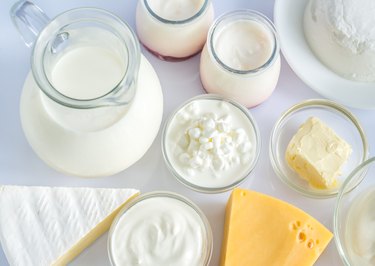
Ice cream tops the favorite food list for many of us. Rich, creamy, sweet and with an endless variety of flavors, there's little reason not to love it — unless it leads to abdominal pain or stomach cramps.
Stomach pain after eating ice cream can sometimes be caused by lactose intolerance or a milk allergy. The two conditions are commonly confused because they can produce similar stomach-related symptoms, but there are some key differences.
Video of the Day
Video of the Day
Ice cream is primarily made from dairy, which can cause various adverse reactions depending on your condition. If you experience severe pain after eating ice cream, avoid eating it until you can talk with your doctor.
Here are some reasons you might experience stomach pain after eating ice cream and what you can do to ease or avoid that discomfort.
Lactose Intolerance
If you find yourself uncomfortable or in pain after eating any variety of milk products, it could be lactose intolerance. An estimated 30 million Americans have some level of lactose intolerance by age 20, per the National Library of Medicine (NLM).
All dairy foods have varying amounts of lactose, which is a type of sugar found in milk. When your body doesn't produce enough of the enzyme lactase, you're unable to break down the lactose molecules, which leads to unpleasant stomach symptoms, according to Johns Hopkins Medicine.
Lactose intolerance can be felt as gas, bloating, cramping or diarrhea after eating certain dairy foods. These symptoms usually arise 30 minutes to 2 hours after eating dairy, per the NLM.
Even though you could eat ice cream without problems as a kid, that may not be the case now. "When you age, you may experience lactose intolerance, so dairy products like ice cream might give you a stomachache," says Amanda Sauceda, RD, a dietitian specializing in gut health. So yes, you can become lactose intolerant over time.
Babies who are born prematurely often have lactose intolerance until their digestive system develops, per Johns Hopkins Medicine. Damage from surgery, injury or diseases of the gastrointestinal tract can also make it difficult to digest lactose.
Not all people with lactose intolerance need to avoid ice cream or all other dairy products. "Lactose intolerance is very personalized and everyone has a different amount of lactose that works for them," Sauceda says.
Maybe this is why ice cream upsets your stomach, but not milk. Or, you may be able to eat cheese, but a glass of milk sends you running to the bathroom — it could take some trial and error to determine what lactose-containing foods you need to limit or avoid.
Milk Allergy
A milk allergy can sometimes be confused with lactose intolerance but is actually very different and potentially much more dangerous.
Between 2 and 3 percent of children under age 3 are allergic to milk, although most will outgrow this allergy by the time they reach age 16, according to the American College of Allergy, Asthma and Immunology (ACAAI).
A milk allergy can cause stomach pains after eating ice cream and other dairy products but is often accompanied by other symptoms such as hives, rashes, vomiting, bloody stools or difficulty breathing, per the ACAAI.
A milk allergy can be confirmed with a skin prick test or a blood test that looks for Immunoglobin E (IgE) antibodies, according to the Cleveland Clinic. "Any time you suspect an allergy, especially if it affects your breathing, you need an immediate trip to the doctor," Sauceda says.
If you have a milk allergy, you may experience symptoms after eating even small amounts of dairy-containing foods. Symptoms occur within 2 to 3 hours after eating dairy. Symptom type and severity range from person to person, per the Cleveland Clinic.
Other Possible Causes
Sometimes stomach pains after eating ice cream are not caused by milk. The sugar, fat and portion size can also trigger an upset stomach.
Sugar
Eating too much sugar at once, or eating sugar substitutes, could cause symptoms like gas, bloating and diarrhea. Sugar can cause your stomach and intestines to pull water and electrolytes in, which can lead to loose bowel movements, per Harvard Health Publishing.
If you're eating ice cream that has sugar alcohols (often found in low-calorie or low-sugar varieties), you might experience gas, cramping and bloating from the indigestible sugar alcohols, according to the Cleveland Clinic.
Eating Too Much at Once
If an ice cream cone is your dessert after a big meal, it could be the amount of overall food that's giving you stomach troubles, Sauceda says. Ice cream is considered a slow-digesting food.
To test this theory, try eating a small amount of ice cream for a snack instead of dessert. If you're able to tolerate the ice cream, you may just have to change up when (and how much) you enjoy it.
Acid Reflux
Nausea and vomiting are two symptoms of acid reflux that could make an appearance after a big bowl of ice cream.
Acid reflux is when acid, liquid or food from your stomach comes back up into your esophagus, per the National Institute of Diabetes and Digestive and Kidney Disease (NIDDK). Other symptoms may include chest pain, a frequent acidic taste in your mouth, trouble swallowing or frequent cough.
One potential trigger for acid reflux is eating high-fat foods, per the NIDDK. Just a 1/2 cup of vanilla ice cream has 7 grams of fat, according to the USDA.
Why Does Ice Cream Upset My Stomach but Milk Doesn't?
The key could be in the amount of ice cream you're eating. "Chances are that you eat a larger portion of ice cream than you would drink a glass of milk. Ice cream is delicious, so it can be easy to eat a lot," Sauceda says.
Other reasons could be related to the fat or sugar content as ice cream is much higher in fat and added sugar than milk.
What to Do After Eating Too Much Ice Cream
It tasted great at the time, but now you're paying the consequences. Here are some things you can do to find relief from stomach pain after eating too much ice cream.
- Drink a cup of tea. Sauceda recommends drinking a cup of peppermint or ginger tea. "These two teas can help settle the stomach, so they are great for your digestion."
- Move gently. Regular exercise can help to relieve bloating, per the Cleveland Clinic. Try gentle yoga, stretching, walking or an easy bike ride to find relief.
- Add heat. Lie down and place a hot water bottle or warm compress on your stomach, Sauceda says. The heat can help calm and relieve stomach pain, she adds. Another alternative would be to take a warm bath.
How to Enjoy Ice Cream Without Stomach Pain
Depending on the cause of your stomach pains after eating ice cream, there are a few tricks to try so that you can enjoy this sweet treat and still feel your best.
- Try a dairy-free ice cream: If you have a milk allergy, the only way to enjoy ice cream safely is by choosing a dairy-free ice cream alternative. Thankfully, you can easily find convincing ice cream alternatives made of almond milk, soy milk and coconut milk at most well-stocked grocery stores.
- Enjoy a smaller portion: If lactose intolerance is the culprit, you have a few options. Try eating a smaller portion to see if eating less lactose at one time feels OK. "This is my favorite way when you want the real deal and a substitute isn't going to cut it," Sauceda says.
- Take a pill: You could also take a lactase enzyme pill, such as Lactaid ($12, Amazon), before spooning in. Taking a lactase enzyme pill provides your digestive system with lactase, the enzyme needed to break down lactose. Lactaid recommends taking the pill with the first bite of dairy to avoid taking it too early or too late to be effective.
- Give it time: To keep stomach pains away, you may want to skip ice cream as your after-dinner dessert. Taking a break between dinner and your bowl of ice cream helps to give your stomach more time to digest the food, Sauceda says. Enjoy ice cream as an afternoon snack or wait for an hour or two between your meal and the ice cream.
- John Hopkins Medicine: "Lactose Intolerance"
- National Library of Medicine: "Lactose Intolerance"
- ACAAI: "Milk Allergy"
- Cleveland Clinic: "Milk Allergy"
- Harvard Health Publishing: "Is something in your diet causing diarrhea?"
- Cleveland Clinic: "What you should know about sugar alcohols"
- NIDDK: "Acid Reflux in Adults"
- Cleveland Clinic: "Bloated Stomach"
- Lactaid: "FAQs"
- USDA: "Ice creams, vanilla"



